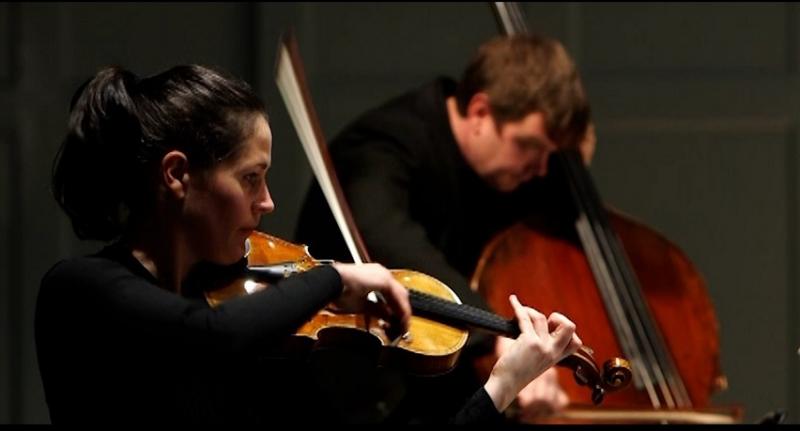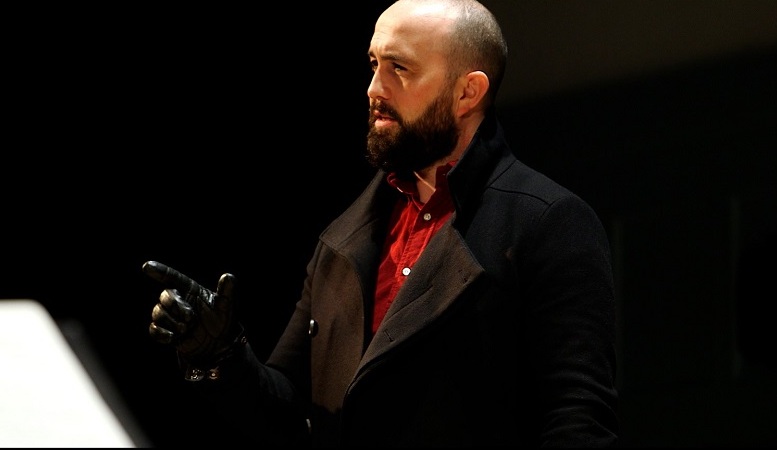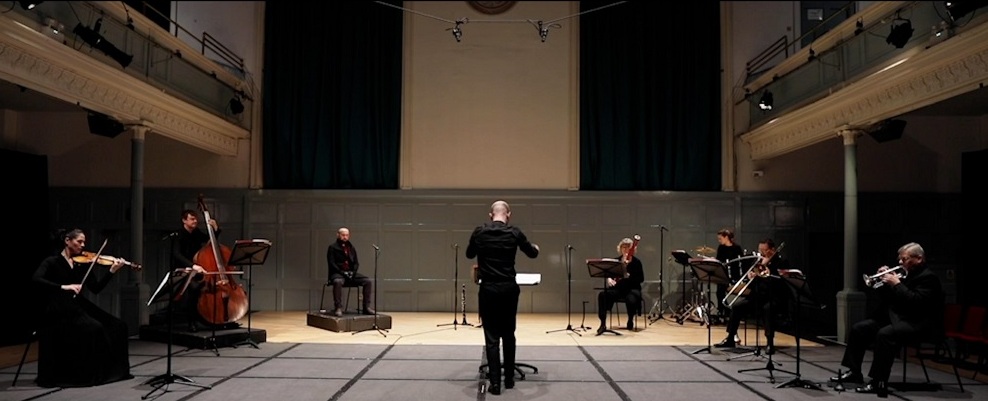The Soldier's Tale, Scottish Chamber Orchestra online review - top performers master a baggy mini-monster | reviews, news & interviews
The Soldier's Tale, Scottish Chamber Orchestra online review - top performers master a baggy mini-monster
The Soldier's Tale, Scottish Chamber Orchestra online review - top performers master a baggy mini-monster
Actor and violinist excel in this Stravinsky-Ramuz confection

Born in exigency at the end of the First World War and soon kiboshed by the Spanish flu, The Soldier’s Tale as originally conceived is a tricky hybrid to bring off. Not so the suite – Stravinsky’s mostly incidental-music numbers are unique and vivid from the off – but the whole story, based on a Russian folk tale about a simple man’s tricky dealings with Old Nick, is awkward, made impossibly complicated and preachy by the Swiss writer Charles Ferdinand Ramuz.
His co-star in the shenanigans is the Scottish Chamber Orchestra’s Siún Milne, who introduces the performance with splendid succinctness. She plays the violin wielded for good effect by the soldier, and for ultimate ill by the devil: nonchalant along the road, slinky-strange in the Tango our hero plays to raise an unhappy princess from her sickbed, and lethal in the final dance. Her partnership with star double-bass player Nikita Naumov is a joy to watch, and in the suite of dances for soldier and princess make sure we don’t miss the dancers usual in the presentation.  These two and clarinettist Maximiliano Martín, called upon for some vivid klezmer sounds here, communicate through the body as well as through sound. Less so the other instrumentalists, but you need a lot of focus to play the cornet as well as Peter Franks. Conductor Gordon Bragg is unobtrusive, as well he might be given that the instrumental septettists rely upon each other for close cohesion in this tricky, rhythm-jumping score.
These two and clarinettist Maximiliano Martín, called upon for some vivid klezmer sounds here, communicate through the body as well as through sound. Less so the other instrumentalists, but you need a lot of focus to play the cornet as well as Peter Franks. Conductor Gordon Bragg is unobtrusive, as well he might be given that the instrumental septettists rely upon each other for close cohesion in this tricky, rhythm-jumping score.
Not even McVarish (pictured above) can conceal a slump in the middle of Ramuz’s monologue-with-music: not another tramp along the road, you think, as the first stage of the adventures is succeeded ever so slowly by the second. And the moralising between the pseudo-Bach chorales as we reach the end is still intolerable, not to mention confused: is it a bad thing to want to go and see your old mum, who didn’t recognise you thanks to the devil’s work, and bring her back to live with you? I sometimes wonder if Afanasyev’s telling of the original tale, into which – as scholar Richard Taruskin has pointed out – the musical numbers fit perfectly, wouldn’t be more satisfactory.  Yet McVarish has all the actor’s tricks at his disposal to differentiate between characters, aided by some nifty camerawork - excellent throughout - in Edinburgh's Queen's Hall, and he conjures props with empty air. I well remember a then-unknown David McVicar’s production, with students and graduates of what was the Royal Scottish Academy of Music and Drama, coming to London in 1991; but this does more with less. It’s probably the best rendering of the full farrago you’ll see, so set aside an hour and adjust to the leisureliness of the tale.
Yet McVarish has all the actor’s tricks at his disposal to differentiate between characters, aided by some nifty camerawork - excellent throughout - in Edinburgh's Queen's Hall, and he conjures props with empty air. I well remember a then-unknown David McVicar’s production, with students and graduates of what was the Royal Scottish Academy of Music and Drama, coming to London in 1991; but this does more with less. It’s probably the best rendering of the full farrago you’ll see, so set aside an hour and adjust to the leisureliness of the tale.
- Watch The Soldier's Tale on the SCO's YouTube channel or on Facebook
- More classical reviews on theartsdesk
rating
Explore topics
Share this article
Add comment
The future of Arts Journalism
You can stop theartsdesk.com closing!
We urgently need financing to survive. Our fundraising drive has thus far raised £49,000 but we need to reach £100,000 or we will be forced to close. Please contribute here: https://gofund.me/c3f6033d
And if you can forward this information to anyone who might assist, we’d be grateful.

Subscribe to theartsdesk.com
Thank you for continuing to read our work on theartsdesk.com. For unlimited access to every article in its entirety, including our archive of more than 15,000 pieces, we're asking for £5 per month or £40 per year. We feel it's a very good deal, and hope you do too.
To take a subscription now simply click here.
And if you're looking for that extra gift for a friend or family member, why not treat them to a theartsdesk.com gift subscription?
more Classical music
 BBC Proms: McCarthy, Bournemouth SO, Wigglesworth review - spring-heeled variety
A Ravel concerto and a Walton symphony with depth but huge entertainment value
BBC Proms: McCarthy, Bournemouth SO, Wigglesworth review - spring-heeled variety
A Ravel concerto and a Walton symphony with depth but huge entertainment value
 BBC Proms: First Night, Batiashvili, BBCSO, Oramo review - glorious Vaughan Williams
Spirited festival opener is crowned with little-heard choral epic
BBC Proms: First Night, Batiashvili, BBCSO, Oramo review - glorious Vaughan Williams
Spirited festival opener is crowned with little-heard choral epic
 Interview: Quinteto Astor Piazzolla on playing in London and why Mick Jagger's a fan
Music Director Julián Vat and pianist Matias Feigin compare notes on Piazzolla
Interview: Quinteto Astor Piazzolla on playing in London and why Mick Jagger's a fan
Music Director Julián Vat and pianist Matias Feigin compare notes on Piazzolla
 Classical CDs: Bells, birdsong and braggadocio
British contemporary music, percussive piano concertos and a talented baritone sings Mozart
Classical CDs: Bells, birdsong and braggadocio
British contemporary music, percussive piano concertos and a talented baritone sings Mozart
 Siglo de Oro, Wigmore Hall review - electronic Lamentations and Trojan tragedy
Committed and intense performance of a newly-commissioned oratorio
Siglo de Oro, Wigmore Hall review - electronic Lamentations and Trojan tragedy
Committed and intense performance of a newly-commissioned oratorio
 Alfred Brendel 1931-2025 - a personal tribute
A master of feeling and intellect
Alfred Brendel 1931-2025 - a personal tribute
A master of feeling and intellect
 Aldeburgh Festival, Weekend 2 review - nine premieres, three young ensembles - and Allan Clayton
A solstice sunrise swim crowned the best of times at this phoenix of a festival
Aldeburgh Festival, Weekend 2 review - nine premieres, three young ensembles - and Allan Clayton
A solstice sunrise swim crowned the best of times at this phoenix of a festival
 RNCM International Diploma Artists, BBC Philharmonic, MediaCity, Salford review - spotting stars of tomorrow
Cream of the graduate crop from Manchester's Music College show what they can do
RNCM International Diploma Artists, BBC Philharmonic, MediaCity, Salford review - spotting stars of tomorrow
Cream of the graduate crop from Manchester's Music College show what they can do
 Classical CDs: Bells, whistles and bowing techniques
A great pianist's early recordings boxed up, plus classical string quartets, French piano trios and a big American symphony
Classical CDs: Bells, whistles and bowing techniques
A great pianist's early recordings boxed up, plus classical string quartets, French piano trios and a big American symphony

Comments
I'm pretty sure this is the
Thank you. They did tell me
Thank you. They did tell me that, but it was clearly adapted to give a Scottish slant.